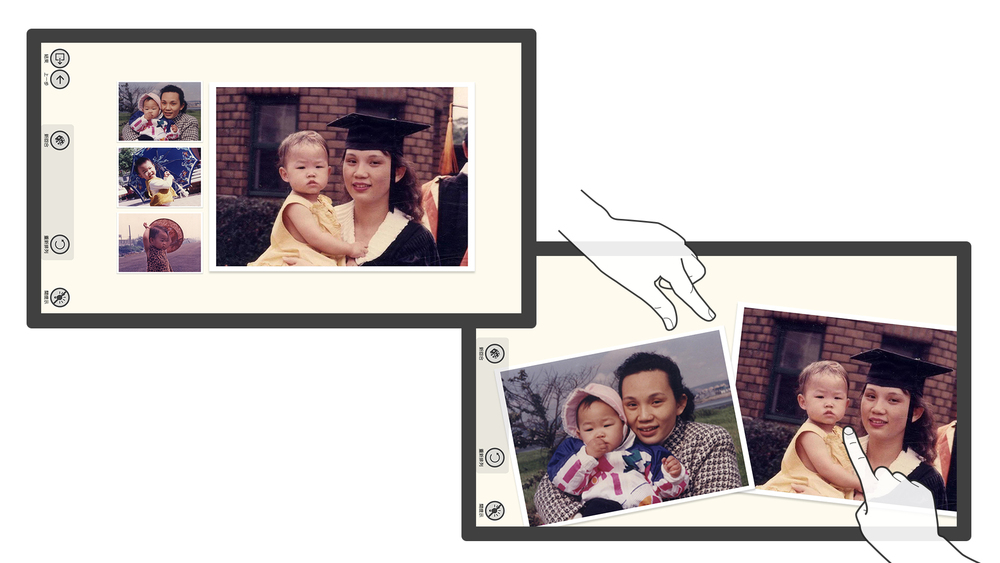BACKGROUND
Tools for the rehabilitation of the elderly living with dementia are needed in Taiwan because those imported from overseas or initially designed for children are inappropriate for elderly users. Most paper-made rehabilitation tools have drawbacks such as inflexible designs or a limited ability to stimulate the user. Caregivers need more customized, interactive tools that meet the needs of the elderly and better reflect their personal experiences, because individual information is not easily included.
The idea came from the card games used in a daycare center that are used for different game modes such as “true or false” and “matching” games. Thus, we came up with this idea by combining personal materials with interactive games to offer users a greater choice of what to play and the kind of themes to talk about in the activities. The most important thing is that the materials match personal experience to allow for repeated use in different game modes.
RESEARCH AND INSIGHT
User experience research (UXR) of the current tools used by the elderly living with dementia in rehabilitation revealed the need for a more interactive reminiscing game.
DESIGN AND FEATURES
We designed a highly flexible reminiscing and touchable rehabilitation game on an all-in-one computer with user avatars on the screen for physical indications and game interaction. The platform is used to collect individual personal photos and preferences from home and upload them to the cloud. The individual contents were pulled together by the a hosting occupational therapist to create a unique monopoly map for the participants with an appropriate level of difficulty to suit their personal experiences, increase interest, and encourage recall of the past. Various cognitive stimuli, including watching movie clips, listening to favorite songs, and touching interactive games help participants experience a sense of accomplishment and satisfaction during the rehabilitation process. A record of the game process is sent to the cloud for analysis of relevant items for the materials that have been used during play. The results provide caregivers with recommended sources for future use in reminiscence activities with different groups.
Based on the UXT findings, we employed UXD to revise the game and improve the user experience. We redesigned a new version of Memoir monopoly, which is played on only one computer. The all-in-one computer allowed us to invite up to five elderly and one caregiver to join the game. The big screen was suitable for enlarging photos to an ideal size. It was also more appropriate for group gaming activity with four iPads, with borders crossing right in the middle of the game map, creating an awkward look. A group activity atmosphere is more likely to be created when everybody sits together and looks at the one screen.
UX TESTING
We conducted a UX test to examine our prototype. Memoir Monopoly was successfully brought into two group rehabilitation events held at day care centers as field tests. Based on observations and interviews with the therapists and caregivers, we found that the elderly living with dementia who participated in the test were more actively willing to share their stories, using their own photos and movies. They also showed more interest in playing the reminiscence games compared to their previous paper game events. This preliminary research results demonstrate that our design might resolve problems found in the UXR. A game matching their life experience and various interactions encouraged the elderly to participate in the reminiscence game. If reminiscence supports memory function, there is the hope that engaging users with this type of group activity could sustain individual cognitive levels and preserve quality of life.
CONCLUSION
The number of elderly dementia sufferers has increased rapidly worldwide in line with a trend towards an aging society. Taiwan alone has more than 150 daycare centers for elderly patients suffering from dementia. By using Memoir Monopoly, caregivers can lead a variety of activities, which can be embedded into daily programs. Thus, it reduces the pressure on caregivers to prepare activities as well as the need to lead different programs. Further, the material database and game records can be used for other medical research. The game is a highly flexible platform that can be used in different scenarios, e.g., the materials and the modules inside the map can be adapted for educational games for children. Therefore, the platform has great business potential in elderly and children markets.























